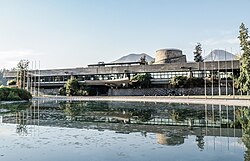United Nations Economic Commission for Latin America and the Caribbean

The United Nations Economic Commission for Latin America and the Caribbean (UNECLAC, ECLAC or CEPAL, in Spanish: Comisión Económica para América Latina y el Caribe) is a United Nations regional commission to encourage economic cooperation. The ECLAC includes 46 member states (20 in Latin America, 13 in the Caribbean and 13 from outside the region), and 14 associate members which are various non-independent territories, associated island countries and a commonwealth in the Caribbean. The ECLAC publishes statistics covering the countries of the region and makes cooperative agreements with nonprofit institutions. The headquarters of ECLAC is in Santiago, Chile.
The ECLAC was established in 1948 as the UN Economic Commission for Latin America. In 1984, a resolution was passed to include the countries of the Caribbean in the name. It reports to the UN Economic and Social Council (ECOSOC).
Member states
The following are all member states of ECLAC:
 Antigua and Barbuda
Antigua and Barbuda Argentina
Argentina Bahamas
Bahamas Barbados
Barbados Belize
Belize Bolivia (Plurinational State of)
Bolivia (Plurinational State of) Brazil
Brazil Canada
Canada Chile
Chile Colombia
Colombia Costa Rica
Costa Rica Cuba
Cuba Dominica
Dominica Dominican Republic
Dominican Republic Ecuador
Ecuador El Salvador
El Salvador France
France Germany
Germany Grenada
Grenada Guatemala
Guatemala Guyana
Guyana Haiti
Haiti Honduras
Honduras Italy
Italy Jamaica
Jamaica Japan
Japan Mexico
Mexico Netherlands
Netherlands Nicaragua
Nicaragua Norway
Norway Panama
Panama Paraguay
Paraguay Peru
Peru Portugal
Portugal Saint Kitts and Nevis
Saint Kitts and Nevis Saint Lucia
Saint Lucia Saint Vincent and the Grenadines
Saint Vincent and the Grenadines Republic of Korea
Republic of Korea Spain
Spain Suriname
Suriname Turkey
Turkey Trinidad and Tobago
Trinidad and Tobago United Kingdom of Great Britain and Northern Ireland
United Kingdom of Great Britain and Northern Ireland United States of America
United States of America Uruguay
Uruguay Venezuela, Bolivarian Republic of
Venezuela, Bolivarian Republic of
Associate members
The following are all associate members of the ECLAC:
Locations

- Santiago, Chile (headquarters)
- Mexico City, Mexico (Central American subregional headquarters)
- Port of Spain, Trinidad and Tobago (Caribbean subregional headquarters)
- Bogotá, Colombia (country office)
- Brasília, Brazil (country office)
- Buenos Aires, Argentina (country office)
- Montevideo, Uruguay (country office)
- Washington, DC, United States of America (liaison office)
Executive secretaries
Themes and programs
Implementing Sustainable Development Goals
A mapping of the ECLAC’s activities to the Sustainable Development Goals (in 2023) shows that its current work emphasizes four SDGs; namely, SDG 17 on partnerships, SDG 8 on decent work, SDG 10 on reduced inequalities, and SDG 16 on peace and justice. In practice, the ECLAC strives toward its own regional paradigm, called Global Environmental Keynesianism, which promotes multidimensional equality as the purpose of development. The commission seeks to balance the new SDGs with its earlier focus on equality and to better emphasize the environmental dimension of economic development.
The ECLAC has been working on a debt-swap strategy since 2016, titled the Debt for Climate Adaptation Swap and Caribbean Resilience Fund. This fund aims to reduce the debt and fiscal constraints for investment in green industries, stimulate growth, promote economic transformation, and expand fiscal space for public investment such as for the SDGs.
See also
- Library of the Economic Commission for Latin America and the Caribbean
- United Nations System
- ELAC Action Plans – Intergovernmental strategy
- Association of Caribbean States
- Community of Latin American and Caribbean States
References
External links
- Official website – UN Economic Commission for Latin America and the Caribbean